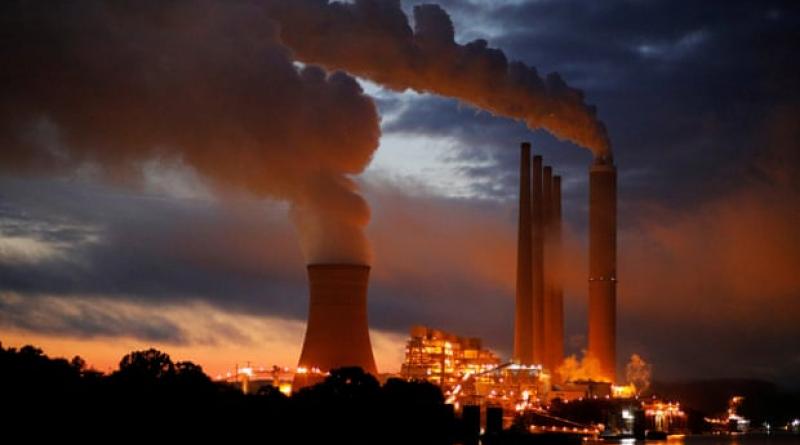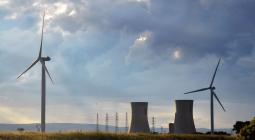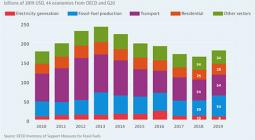Over 5,600 fossil fuel companies have taken at least $3bn in US Covid-19 aid.

Businesses include oil and gas drillers and coal mine operators, an analysis by Documented and the Guardian finds.
More than 5,600 companies in the fossil fuel industry have taken a minimum of $3bn in coronavirus aid from the US federal government, according to an analysis by Documented and the Guardian of newly released data.
The businesses include oil and gas drillers and coal mine operators, as well as refiners, pipeline companies and firms that provide services to the industry.
The Small Business Administration (SBA) on Monday released the data under pressure for further transparency, including from journalism outlets that hadsued demanding the public records.
The $3bn figure is probably far less than the companies actually received. The SBA did not disclose the specific amounts of loans and instead listed ranges. On the high end, fossil fuel companies could have received up to $6.7bn. At least 475 fossil fuel companies received at least $2m, according to the data the SBA released that it collected from banks.
This analysis only includes loans over $150,000, because the SBA did not disclose which companies received smaller loans.
Fossil fuel companies are not restricted from taking the forgivable Paycheck Protection Program (PPP) loans, designed to be used to keep paying employees and to cover recurring bills during the pandemic. But environmental advocates say that investing billions in an industry that is polluting the planet and causing the climate crisis is short-sighted and a bad use of public money.
“Federal aid should be going to help small businesses and frontline workers struggling as the result of the pandemic, not the corporate polluters whose struggles are a result of longstanding failing business practices,” said Melinda Pierce, Sierra Club legislative director.
The Guardian attempted to contact all of the companies named in this story for comment and did not receive responses by deadline.
Several of the companies receiving loans of at least $5m reported having 500 employees, which is the upper end of what the government considers to be a small business. One was the Navajo Transitional Energy Company, which owns four mines including the one on Navajo nation territory that supplies coal to the large Four Corners coal plant. The plant is run by Arizona Public Service Co, which will close it in 2031 when its coal contract expires.
The eastern Ohio coal company CCU Coal and Construction, which reported having 148 employees, also took at least $5m. Last year, the company announced plans to cut half of its staff, or 205 jobs, because American Electric Power is closing a plant it provides coal to in Conesville.
The Sunflower Electric Power Corporation, which is owned by customers and not investors, also got at least $5m. It announced earlier this year that it would pull the plug on a long-delayed coal-power project in Kansas.
The list of recipients getting at least $5m also included oil drillers. Four were listed as top 10 drilling rig operators in Texas late last year: Independence Contract Drilling, Latshaw Drilling Company, NorAm Drilling Company and Scandrill.
Jesse Coleman, a researcher for Documented, said: “We should not be wasting taxpayer dollars on an industry that’s in a tailspin of its own making, especially when it seems intent on bringing the whole planet down with it.”
A separate review by the watchdog Accountable.US and the Guardian found that millions of dollars in coronavirus aid has also gone to companies with histories of significant environmental violations.
Pacific Ethanol, a California company that makes a biofuel that is blended into gasoline, took $9.9m. Multiple Pacific Ethanol facilities have been cited for breaking water and air pollution laws year after year, racking up $2.6m in environmental fines over the last five years, according to an Environmental Protection Agency (EPA) database.
In 2017, the Sierra Club sued the company, arguing its bioethanol plant in Pekin, Illinois, had “brazenly and consistently violated its water-pollution permit for years”, releasing hot and polluted wastewater into the Illinois River.
Rob Weinstock, an environment lawyer who worked on the Illinois case against Pacific Ethanol, said the company repeatedly failed to correct problems with its Pekin plant and stalled regulators by requesting permission to conduct a study on the effects of releasing hotter water into the river and then delaying that study.
Paul Koehler, Pacific Ethanol’s spokesman, contested the EPA data showing the company has been fined $2.6m, saying it has been fined less than half that amount and that many of the penalties were for problems it self-reported.
He said the company produces low-carbon renewable fuel and aims to lower emissions. Many environmental advocates argue, however, that growing corn to produce ethanol to blend into gasoline damages the environment and still results in air pollution.
Koehler said most of the company’s violations over the last five years were in California and were from equipment failures that Pacific Ethanol self-reported while trying to fix.
A second company, Perma-Fix Environmental Services, a waste management company, took a $5.7m loan. It was fined $390,000 in the last five years, according to the EPA database. Perma-Fix in May saw revenues increase 112%to $24.9m, compared to the same period last year. That equaled about $1.2m for stockholders.
A third company, the chemical manufacturer LSB Industries, received $10m. LSB Industries incurred $236,000 in federal environmental fines since 2015, according to EPA. In 2014, the company and its subsidiaries paid $725,000 in penalties to settle alleged federal and state air quality violations at 10 nitric acid plants in four states, Oklahoma, Alabama, Arkansas and Texas.
In total, at least nine companies that were fined for environmental violations in the last five years have been awarded $35m. Those numbers are based on filings from publicly-traded companies in regulatory filings. The full total is probably far higher.
There is no restriction against companies with environmental violations taking PPP loans, but accountability experts say the government should be thoroughly screening them before disbursing aid.
“This all boils down to a question of financial responsibility,” said Chris Saeger, director of strategic initiatives at Accountable.US.
“If you have proved yourself to be bad with money, if you have proved yourself to cost your shareholders and cost your company money through environmental violations, then you’re probably not going to be responsible to us taxpayers.”
7 Iουλίου 2020
The Guardian




